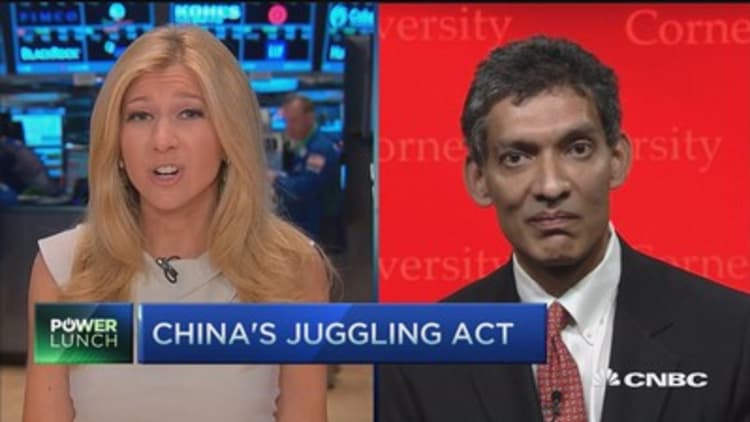Nearly two months since Beijing rushed to the aid of its battered markets, stocks appear to have stabilized, and now investors are wondering: what next for China's market intervention?
Shanghai equities have climbed 3.6 percent over the past 30 days after officials unleashed a wave of bold stabilization policies starting June 27 in a bid to halt panic selling and prevent a systematic crash.
By allowing a trading halt on equities equaling almost half the market and instituting a ban on shareholders selling their stocks, the government was "digging itself deeper into the unwanted role of lender of last resort for the economy and buyer of the last resort for the stock market," Lim Say Boon, DBS chief investment officer, remarked in a note on Friday.
Indeed, it's not in Beijing's interest to continue since aggressive intervention dents investor confidence and goes against the country's goal of pursuing market-oriented reforms.
Read More Welcome to China's new 'managed float' regime
"How the government will exit its market bailout has therefore become a key concern. Investors should prepare themselves for a slow and painful process," one that could last more than six months and likely involve more market declines, BNP Paribas warned in a report on Friday.
BNP set out out the steps Beijing could take to extricate itself from markets:
Resume normal transactions in the 510 stocks that are still suspended from trading
Beijing suspended more than 1,400 stocks out of the market's total 2,780 as part of its stabilization program; banks including HSBC and BNP estimate that more than 500 are still in pause mode. Stock suspensions, essentially a form of market closure, are highly damaging to market sentiment as they reduce liquidity and distort valuations.
In other words, "the government stabilized the market by denying the market," DBS' Lim noted.
Publicize how the police have discovered illegal transactions and tout possible punishments
Beijing is slowly moving in this direction, judging by recent announcements.
Last month, the China Securities Regulatory Commission (CSRC) declared war on "malicious" short-sellers, warning that anyone involved in market manipulation would be investigated and punished.
Officials announced last month that they found evidence of tampering in securities futures but didn't provide any further details.

Allow initial public offerings (IPOs) and secondary public offerings (SPOs) to resume
This is one step Beijing has reportedly already taken, according to local media. On Friday, the China Daily reported that the CSRC had approved new share offerings for more than a dozen companies, indicating the end of a month-long hiatus.
The report is a sign that that authorities are indeed keen to scale back rescue measures, BNP Paribas said.
Make clear how the CSF will play a stabilizing role in the market
The China Securities Finance Corp (CSF) is a state-backed agency tasked with buying shares on the government's behalf, perhaps the boldest measure in Beijing's stabilization program. Regulators confirmed on Friday for the first time that government buying was here to stay.
"For a number of years to come, the China Securities Finance Corp. will not exit (the market). Its function to stabilize the market will not change," the CSRC said in a statement on its official microblog.
Further details on the CSF's purchases could provide well-needed transparency for fraught investors.
Abandon the illusion of index support
Beijing views 4,500 points on the Shanghai Composite index as a return of market confidence, a target still well off from Monday's 3,960 level.
Market players are also sticking to that target. Last month, a group of 21 securities brokerages pledged to invest 120 billion yuan ($19 billion) in blue-chip exchange traded funds and said they would refrain from selling holdings until the benchmark stock index breached 4,500, according to an official statement.
But such clearly-defined index support could translate into future selling pressure and test China's resolve for market liberalization, BNP warned: "The government must be aware that capital market can't be commanded, and bubbles will have to bust sooner or later."

